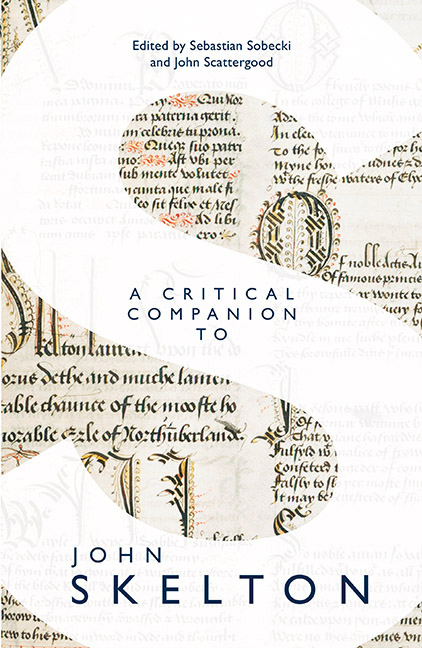Book contents
- Frontmatter
- Dedication
- Contents
- Acknowledgements
- Contributors
- Abbreviations
- Conventions
- Introduction
- 1 John Skelton (?1460–1529): A Life in Writing
- 2 Religion
- 3 Law and Politics
- 4 Classical Literature
- 5 Humanism
- 6 Satires and Invectives
- 7 Lyrics and Short Poems
- 8 Skelton's Voice and Performance
- 9 Literary Tradition
- 10 Skelton and the English Language
- 11 Skelton's English Works in Manuscripts and Print
- 12 Skelton's English Canon
- 13 Reception and Afterlife
- A Skelton Bibliography
- Index of Manuscripts
- Index of Printers and Stationers
- General Index
10 - Skelton and the English Language
Published online by Cambridge University Press: 24 July 2019
- Frontmatter
- Dedication
- Contents
- Acknowledgements
- Contributors
- Abbreviations
- Conventions
- Introduction
- 1 John Skelton (?1460–1529): A Life in Writing
- 2 Religion
- 3 Law and Politics
- 4 Classical Literature
- 5 Humanism
- 6 Satires and Invectives
- 7 Lyrics and Short Poems
- 8 Skelton's Voice and Performance
- 9 Literary Tradition
- 10 Skelton and the English Language
- 11 Skelton's English Works in Manuscripts and Print
- 12 Skelton's English Canon
- 13 Reception and Afterlife
- A Skelton Bibliography
- Index of Manuscripts
- Index of Printers and Stationers
- General Index
Summary
For those prepared to look beyond the dismissive summation of Skelton's work as that of a ‘rude rayling rimer’ (Puttenham 1589: 69), his play with language is fascinating. For many of his contemporaries, and for modern critics beginning with Isaac D'Israeli (1841), Skelton's voice has been one characterised primarily by the use of many pungent and unusual expressions in the low style, some his own coinage, and also by Latinate and aureate neologisms in the high style. His was, as Valerie Allen has put it, ‘a conscious and serious intention to expand the possibilities of his native language’ (Allen 1987: 20). It was also a highly playful linguistic strategy, as has been observed by Douglas Gray, to whose memory this chapter is dedicated.
Even against the rich background of European and Scottish linguistic experiment, Skelton is outstanding. To say that he was deeply interested in language is a gross understatement: he has a creative fascination with language. Indeed, one sometimes suspects that for him, as for Panurge, language was the stuff of magic. He is fascinated by shifting senses and registers, by linguistic duplicity and double talk, and by the power of words.
He uses a vocabulary of extraordinary richness and variety, both learned and colloquial, barely matched by any English poet before Shakespeare. And he also shows a truly remarkable creativity.
(Gray 2012: 145)It is not only the vocabulary of Skelton's poetry that proves idiosyncratic, but also the metre, and the patternings of sound effects, and play with them. For a fuller appreciation of his poetry and his prose, close engagement with the way Skelton's language was pronounced is important also. Following some preliminary comments, this chapter focusses on vocabulary in the first half, and on sounds, spellings and grammar in the second.
The state of the English language, and attitudes about its use in the early Tudor period, have been explored in detail in the standard histories (see for example Lass 1999; Baugh and Cable 2013; Blake 1996; Jones 1953; Barber 1976; on the wider European context see Gray 2012). Briefly put, pronunciation, grammar and vocabulary were evolving in such a way that linguists mark the end of the Middle English period c. 1475–1500, and categorise English from 1500 onwards as ‘early Modern’.
- Type
- Chapter
- Information
- A Critical Companion to John Skelton , pp. 139 - 162Publisher: Boydell & BrewerPrint publication year: 2018
- 1
- Cited by



